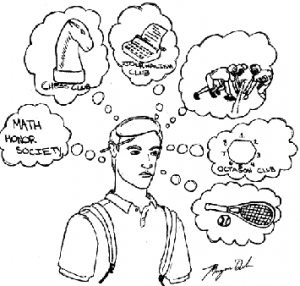
With nightmares of college rejection emails and dreams of impressing admission committees, a new sector of the high school population has emerged: club hoppers.
Club hoppers are students who join as many clubs as possible for the purpose of seeming involved with the community. While doing so may seem to help students gain college admission, club hoppers cause more stress for themselves, preventing themselves from developing one passion and ultimately underwhelming admissions officers.
As tiny eighth graders sitting in the auditorium on the day of orientation, we were implored to find our niches and get involved. Some students took this as a command to join as many clubs as possible, despite their actual interests (besides one day getting into Harvard or Stanford).
It’s the ideal of every stereotypical high school movie: the student with straight A’s, leadership roles in five clubs and a tri-sport varsity position attends an Ivy League university and leads a successful, happy life. This stereotype, which many high school students aim to achieve, degrades students’ capabilities.
Some of the nation’s premier universities insist that the way to get in is by being yourself. Several college tours have translated this ambiguity: find something you’re passionate about, and excel.
By randomly joining many clubs without actually wanting to, club hoppers deny themselves the chance to become truly involved in high school and develop their passions. Extracurricular activities are crucial for self-knowledge and growth, and provide a better understanding of one’s passions for career choices and college decisions later on.
Club hoppers also detract from the overall club experience of members who are genuinely interested. Clubs are communities and provide channels for people with similar interests to interact. Those who aren’t genuinely interested take away from that unity.
